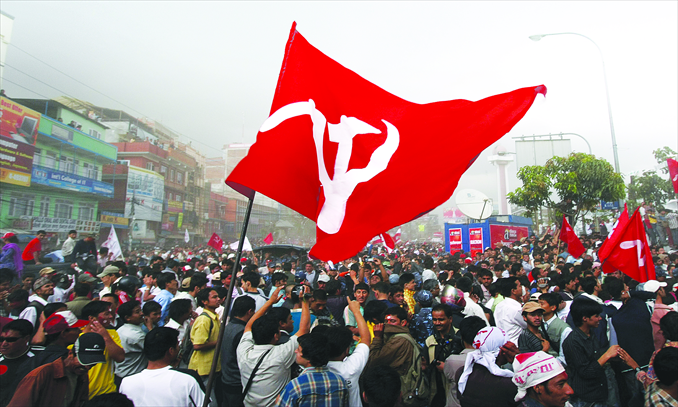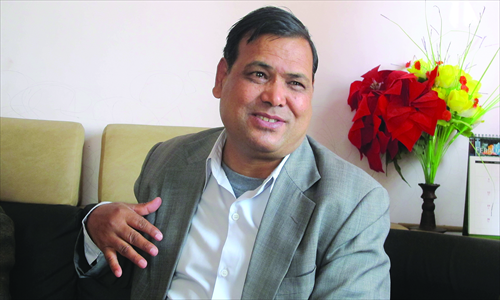Maoism, borrowed and abandoned

Even as the Chinese people moved on from the days of Mao 30 years ago to Deng Xiaoping's reform and opening-up period, some in Nepal still rely over Maoism. But now, Nepal Maoist leaders feel the need to reorient this ideological course to achieve socialism through capitalism.
"To achieve socialism through the model of new democracy, we need to change our political system and economic system," Sadip Bahadur Shah, retired Lieutenant-General of the ruling Unified Communist Party of Nepal (UCPN)-Maoist, told the Global Times. "We need to learn economic development from China."
Since the civil war ended in 2006 leaving 16,000 people dead, the Maoists have entered Nepal's political mainstream and are now the largest force in the country's Constituent Assembly.
However, the political path is not any smoother than it was in the jungle. Last year a faction broke away from the guerrilla group-turned-political party as it was struggling to implement a peace deal and failed to ensure that former Maoist fighters were integrated into the army "in a respectable manner."
When the Maoist launched the People's War in 1996, it attracted many young people with hopes of revolutionary change. Now some former guerrillas see their victory as little more than a pipedream.
"When we agreed on peace, there was a challenge to retain the party's revolutionary spirit," one of the breakaway faction leaders, Khadga Bahadur Bishwakarma, was quoted as saying. "We concluded that there was no alternative but to form a new party."
Some profit, some don't
During the civil war, each cadre of the Maoist army got their own nom de guerre. His is Atom. He said the name gave him strength, power and courage during the war. That was 1997, the second year of the People's War, when 18-year-old Atom followed his teacher Shah into the Maoist army.
"At first we had no arms, we only used sticks. We demanded that our people give us their home-made guns for us to fight against our enemy," Atom told the Global Times.
Believing in Mao's philosophy that political power comes from the barrel of a gun, they managed to capture modern weapons from the national army. But Atom knew the chance to win was very slim as they did not have any support from outside of the country. The war eventually ended in 2006.
From the jungle to a civilian life was not a harmonious transition for many former fighters. Among 31,000 Maoists, only 3,000 were integrated into the security forces. Most of those who were unqualified, many still under 18 were paid off. They received sums between 500,000 to 800,000 rupees ($9,200) from the government to help them to build a civilian life.
Despite his contributions to the Maoist army, Atom was not accepted into the national army with a "respected position" due to his low-level education. Now he has received a retirement package of 600,000 rupees.
Many former fighters complain that they feel neglected and have received little support from the government.
Some 400 former Maoist fighters and former child soldiers camped outside the party's headquarters in Kathmandu to demand equal treatment for retired combatants in 2012.
The government promised to give 200,000 rupees ($2,300) to each 4,000 disqualified combatants. But protesters said these payments have been delayed.
"We made some mistakes, we didn't help the former troops get enough education and help," said Shah. He added that people have lost properties during the war, now they can use that money to buy them again.
There are reports that some former fighters' compensation money was snatched by their commanders. But Shan denied the report, saying the Maoist party is not stealing their retirement money.
But it seems that Deng Xiaoping's famous remark "let some get rich first" also applies in Nepal, one of the world's poorest countries, as there are also reports that a Maoist leader has adopted a millionaire's lifestyle.
The Daily Telegraph reported that the Nepali Maoist leader Prachanda who once led the People's War has found himself outside the jungle with a red-brick mansion complete with swimming pool and badminton court.
It said his family rented the mansion for $1,220 per month, while the average salary in Nepal is less than $305 per month.
"Comrade Prachanda has a war chest of more than a billion rupees and has achieved his own particular proletarian dream. It's just too bad for the rest of his supporters," Pashupati Shumsher Rana, former minister and the head of the royal Rana clan, was quoted as saying.
Atom thinks the divide between rich and poor within the Maoist movement is only a transitional situation.
"Some people outside of our party tell us we can't have too much money," he said. "But I think it is only temporary, we will solve the problem."
Another issue the Maoist party needs to solve is how to deal with the caches of weapons that Atom and other former fighters have collected. Opposition parties have been carefully watching the Maoists to see if they will hand over all their weapons to the state.
An agreement has been reached to confine former Maoist fighters to UN-monitored camps and lock up their weapons. For years there have been over 3,400 Maoist pistols, guns and other weapons stored in special containers in seven temporary places across the country.
Last year, the US recognized the Maoist party's efforts to forward the peace process and removed it from its list of global terrorist groups. It said the Maoist party "no longer engaged in terrorist activity that threatens the security of US nationals or US foreign policy."
International outlook
To polish its international image and attract international tourists, the Maoist party launched a new tourist trail called Guerrilla Trek in 2012, which lasts about four weeks and allows tourists to get a closer look at the routes and hideouts used by the guerrillas.
The trail is welcomed by many Chinese tourists who are curious to see Mao Zedong's guerrilla warfare used in the Nepali fashion.
The interest is mutual. Maoists are eager to know more about China. Tarzan, Shan's younger son, is learning Chinese.
"We follow Maoism and Mao is our ideological leader," he told the Global Times, "so we need to learn more about China."
Ever since the Maoist party took power, its interactions with China have grown with the first Maoist Prime Minister Prachanda invited to attend the 2008 Beijing Olympic Games.
In a bid to strengthen ties with China, a high-level Maoist delegation of 11 members visited Hunan Province, the birth place of Mao Zedong, and other places in 2010. Last year, China's former prime minister Wen Jiabao paid a short visit to Nepal. The same year, an agreement was signed to build a $ 1.6 billion West Seti hydropower plant in west Nepal. The project is expected to be completed by 2019.
"The interaction with China is not really always welcomed," Shah said, hinting that traditionally pro-Indian opposition parties are raising concerns about Chinese influence.
However, Madan Regmi, chairman of the China Study Center, told the Global Times that the Maoist party had left its Maoism roots behind.

"Unlike China's Communist Party who fought for all the people, Nepali Maoists only fought for their community," he said.
The vice president of the Nepali Congress Party Ram Chandra Paudel blamed the UCPN-Maoist for being reluctant to draft a democratic constitution and further said that coming to power is UCPN-Maoist's ultimate goal, according to a report in the Himalayan Times in February.
"People have once again hit the streets to bail the nation out of the politics of violence exercised by the UCPN-Maoist. They have turned a deaf ear to the President's call for national unity government," Paudel was quoted as saying.
Meanwhile, the president of Rastriya Prajatantra Party, Pashupati Shumsher Rana, blamed the government for massive corruption.
"Inflation is mounting and the nation is heading on the path to becoming a failed state," he was quoted as saying.
As the ruling Maoist party is changing its ideology, there might also be a possibility of giving up its past anti-India stance.
"We will follow the path of capitalism to achieve communism instead of pursuing New Democracy as propounded by Chairman Mao Zedong," Narayan Kaji Shrestha, vice chairman of UCPN-Maoist and the deputy prime minister, was quoted as saying. He added that opposition to India cannot be a basis of national politics.
Speaking with reporters at the annual session of China's top political advisory body last year, Mao Xinyu, a grandson of Mao Zedong and a major general in the People's Liberation Army, said "The application of Mao Zedong Thought should help maintain stability and development."
He added that Mao's idea of "people's war" is not relevant in today's world.
Instead, Bhaskar Koirala, director of Institute of International and Strategic Studies, suggests that China-India-Nepal trilateral cooperation would provide an exceptional platform to promote regional peace, stability and growth.
"A wholesome embrace of a trilateral framework by Nepal would appear to indicate a desire to bring these two giant neighbors together within the Nepalese theater in a transparent and mutually constructive manner," Koirala told the Global Times.
"Namely that Nepal should be a zone of peace."